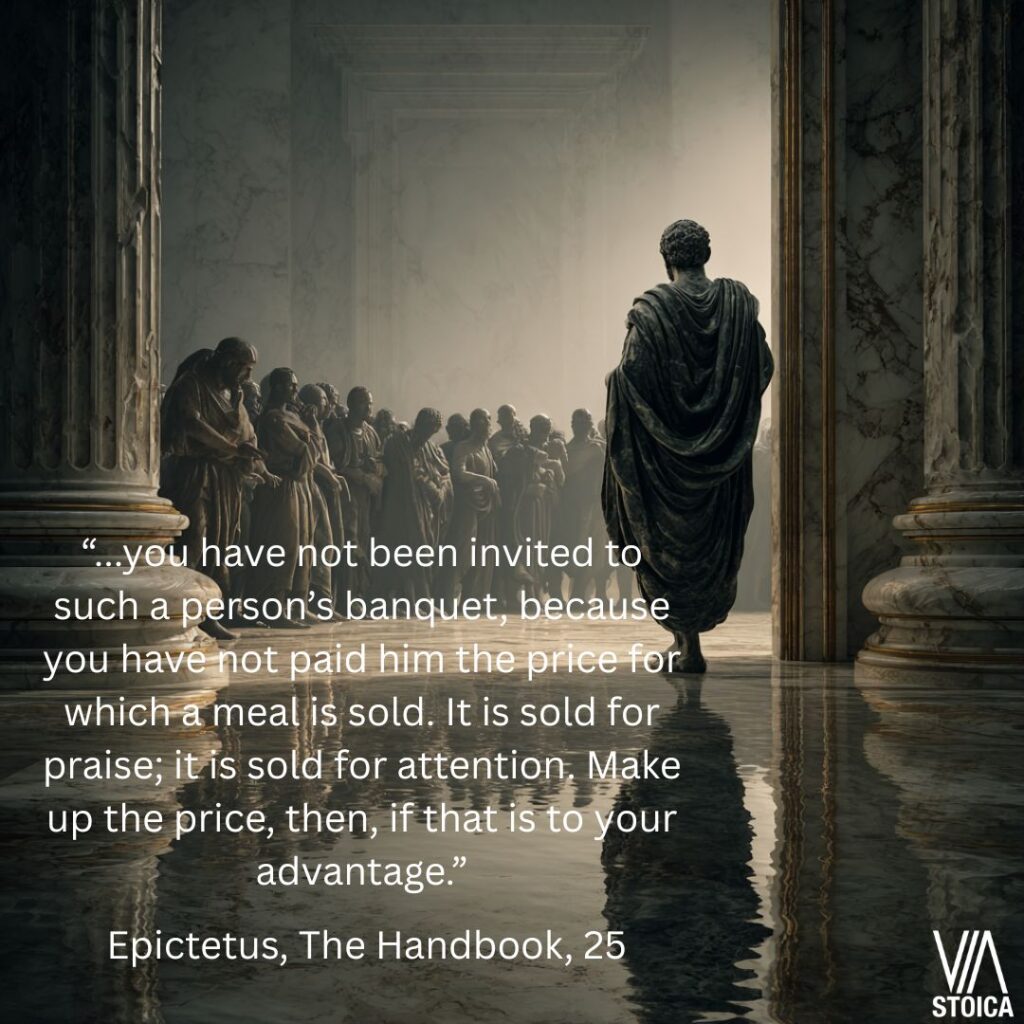“…you have not been invited to such a person’s banquet, because you have not paid him the price for which a meal is sold. It is sold for praise; it is sold for attention. Make up the price, then, if that is to your advantage. But if you would at the same time not pay the one and yet receive the other, you are greedy and stupid. Have you nothing, then, in place of the meal? Yes, indeed, you have: that of not praising someone you did not want to praise, and of not putting up with the people around his door.”
Epictetus, The Handbook, 25

This sharp reminder from Epictetus cuts to the heart of a very modern trap: the temptation to trade our integrity for access, attention, or approval. Whether it’s a corporate hierarchy, a social circle, or a digital following, we’re often asked to “pay the price”, not in money, but in praise and performance.
But the Stoic view on praise and flattery is clear: if the cost of the invitation is compromising your values, you are better off not attending the banquet at all.
Practical reflections or insights
1. Not everything is worth the price
Epictetus calls us out for wanting the perks of praise without the compromise it demands. If you truly admire someone, let your praise be genuine. But if you’re offering flattery just to gain favor, you’re selling part of your soul for scraps.
2. True self-worth is internally sourced
Stoicism teaches us to root our worth in our character, not in someone else’s recognition. The Stoic view on praise and flattery invites us to measure ourselves by our actions, not by applause.
3. Freedom is found in walking away
You always have something in return: the freedom to withhold false praise, and the peace of avoiding those who demand it. That’s a quiet kind of dignity, and one well worth keeping.
4. This goes back to Diogenes
We can trace the Stoic view on praise and flattery all the way back to the Cynics, especially Diogenes. In one story, Plato teased Diogenes for washing lettuce instead of attending a banquet hosted by a tyrant. Diogenes replied that if Plato had chosen to wash his own lettuce, he wouldn’t have to flatter tyrants for a meal.
It’s a perfect example of what Epictetus later articulated: if the price of a meal is praise, and you don’t want to give it, then don’t eat it. The cost is too high when it chips away at your self-respect.
FAQ Section
What is the Stoic view on praise and flattery?
Stoics view praise and flattery with suspicion, especially when they require you to compromise your integrity. They believe true worth comes from virtue, not validation.
Why does Epictetus warn against people pleasing?
Because it leads you to act against your nature. When you seek approval from others, you risk losing your independence and becoming a slave to external judgments.
How can I stop needing validation from others?
Practice focusing on what is within your control, your actions, your choices, and your values. Let others think what they will; your peace lies in what you do, not in what they say.
Want to explore more Stoic strategies?
Book a free consultation with one of our Stoic Coaches or read more on the Epictetus Quotes page. You can also listen to the Via Stoica podcast on Spotify or Apple Podcasts or watch it on YouTube.


0 Comments